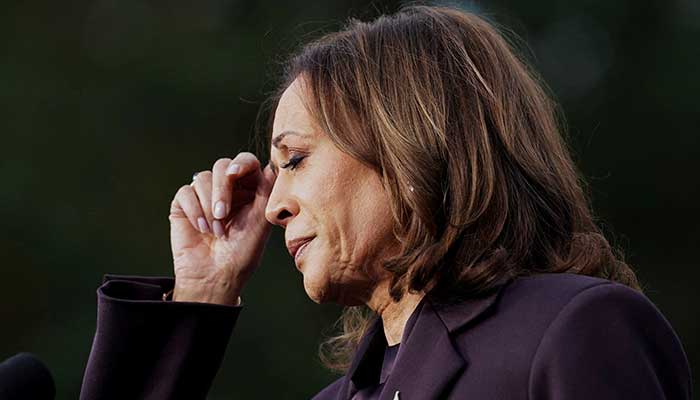How did Kamala Harris lose this election?
Vice president started her presidential race with huge disadvantage due to being closely tied to incumbent govt
WASHINGTON: The 2024 election looks eerily similar to 2016’s, when former secretary of state Hillary Clinton lost to Donald Trump despite being the favourite going into the race.
Which begs the question: Can a woman never hope to be US president?Former president Trump did the impossible in winning the presidency. Republicans have also won control of the Senate and appear to have the upper hand in the House race, at press time on Nov 6.
This election was truly a gendered election. Harris had a 10-point advantage with women – 54 per cent, to Trump’s 44 per cent – with the figures flipped when it came to men, according to ABC News preliminary exit poll data released on Nov 6.
Clinton had lost the election in 2016 for a plethora of reasons, including Russian disinformation, a damaging Federal Bureau of Investigation probe regarding her e-mail servers and complacency over the Rust Belt states.
But at the heart of it, she was seen as cold, calculated and unlikeable – although many pointed out that the bar was unfairly higher for her because she was a woman. In comparison, Trump could get away with the most outrageous, misogynistic comments.
Still, it would not be accurate to chalk Harris’ dismal results up to a deep-seated sexist belief that a woman can never be US president.
The reality was that she had started this race with a huge disadvantage as the vice-president closely tied to the incumbent government. This was an election of change, as broad economic discontent drove voter sentiments.
More than seven in 10 Americans thought the country has been heading in the wrong direction. More Americans – even in middle- and higher-income households – lived pay cheque to pay cheque in 2023 than in 2019, according to a Bank of America Institute study.
Trying to brand herself an agent of change with “a new way forward” was always going to be an uphill battle for Harris, even with the Democratic Party’s incredible discipline, its strong ground operations to get out the vote, and her campaign’s impressive efforts to put together policy proposals to build an opportunity economy and improve lives for the broad middle of Americans.
As Trump had put it during his one and only debate with her: “She started by saying... she’s going to do all these wonderful things. Why hasn’t she done it? She’s been there for 3½ years.”
Compared with Trump, who has had the benefit of being president for one term and gaining national name recognition, Harris was the underdog who had to establish who she was and what she stood for. This is a tall order to beat in four months.
-
 Princess Kate Talks About 'hard Conversations' With Kids Amid Andrew Drama
Princess Kate Talks About 'hard Conversations' With Kids Amid Andrew Drama -
 Prince William Mocked For Being ‘most Reluctant’ King-in-waiting
Prince William Mocked For Being ‘most Reluctant’ King-in-waiting -
 Prince William Makes Rare Admission After Andrew Arrest
Prince William Makes Rare Admission After Andrew Arrest -
 ‘Got A Lot Of People Gunning For Me’: Trump Makes First Comments On Mar-a-Lago Intruder
‘Got A Lot Of People Gunning For Me’: Trump Makes First Comments On Mar-a-Lago Intruder -
 What Countries Have A Say In Andrew Removal From Line Of Succession?
What Countries Have A Say In Andrew Removal From Line Of Succession? -
 How Did Luci4 Die? Police Probes 'BodyPartz' Sudden 'suspicious' Death
How Did Luci4 Die? Police Probes 'BodyPartz' Sudden 'suspicious' Death -
 King Charles Criticized By Princess Anne Over Andrew Drama
King Charles Criticized By Princess Anne Over Andrew Drama -
 Hailee Steinfeld Details Preparations Ahead Of Welcoming First Kid With Josh Allen
Hailee Steinfeld Details Preparations Ahead Of Welcoming First Kid With Josh Allen -
 Shocking Details Revealed About Gunman 'Austin Tucker' Shot Dead At Trump’s Resort 'Mar-a-Lago'
Shocking Details Revealed About Gunman 'Austin Tucker' Shot Dead At Trump’s Resort 'Mar-a-Lago' -
 Queen Camilla Meets Gisèle Pelicot, Sends Powerful Message To Victims As Andrew's Scandal Deepens
Queen Camilla Meets Gisèle Pelicot, Sends Powerful Message To Victims As Andrew's Scandal Deepens -
 Cancer-stricken King Charles At Breaking Point?
Cancer-stricken King Charles At Breaking Point? -
 Andrew Leaves King Charles No More Moves To Play: ‘Can’t Just Say We Got Nothing’
Andrew Leaves King Charles No More Moves To Play: ‘Can’t Just Say We Got Nothing’ -
 Sterling K. Brown Explains How Sharing His Kids' Photos On Social Media Can Keep Them Safe
Sterling K. Brown Explains How Sharing His Kids' Photos On Social Media Can Keep Them Safe -
 Keir Starmer Gives Major Advise To King Charles Amid Andrew Scandal
Keir Starmer Gives Major Advise To King Charles Amid Andrew Scandal -
 Nick Reiner Pleads Not Guilty In Famous Parents' Double Murder Which Shocked The World
Nick Reiner Pleads Not Guilty In Famous Parents' Double Murder Which Shocked The World -
 Benicio Del Toro On Losing Mom In Chldhood: 'I’m Still Dealing With It'
Benicio Del Toro On Losing Mom In Chldhood: 'I’m Still Dealing With It'




